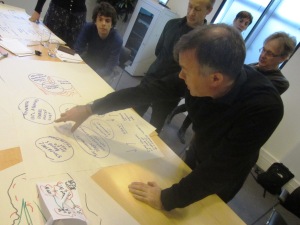Somewhere in your community or organisation, groups of people already doing things differently and better. To create lasting change, find these areas of postive deviants and fan their flames.
At the moment, there’s a couple of interesting discussions going on on (my favourite community)  KM4Dev, and I think they’re related. They both started on 19 September: the first was initiated by Sebastiao Ferreira on learning from failure and the second by Ewen Le Borgne on positive deviants. I’m going to start with positive deviants and then look at the link to failure in a couple of blog posts because I have a lot to say on this subject…
KM4Dev, and I think they’re related. They both started on 19 September: the first was initiated by Sebastiao Ferreira on learning from failure and the second by Ewen Le Borgne on positive deviants. I’m going to start with positive deviants and then look at the link to failure in a couple of blog posts because I have a lot to say on this subject…
A couple of years ago, Laxmi Prasad Pant and Helen Odame wrote a paper, The promise of positive deviants, for the KM4D Journal which had a big influence on me. I thought about this paper – like a dog chewing on a bone – off and on for quite a while and even changed IKM Emergent’s communications strategy to reflect their insights into positive deviants. In particular, they highlighted the importance of positive deviants in the sphere of knowledge.
Pant and Odame considered that (agricultural) knowledge is managed in highly contested environments where uncertainty characterizes stakeholder interactions. One dimension of this this disorder are so-called positive deviants who act out against the structures and ‘rules of the game’ in knowledge creation, application and regeneration. Positive deviants as powerful agents of change and are, for example, able to bridge the divides between expert and local knowledge systems. However, positive deviants have not yet been recognized in terms of their potential in international development because the legacy of deviancy theory lies on negative deviants, such as addicts and criminals.
Pant and Odame argue that positive deviants initiate change in spite of difficult social and organizational environments: full of unpredictable obstacles or interferences. Moreover, they believe that challenging the status quo is one way to harness individual creativity and innovations in spite of constraining social structures and institutional-setups. In other words, social structures impose constraints to individual agency or action, and that structure and agency are a duality that cannot be conceived separately from one another (Giddens, 1984). This resonantes with IKM Emergent which, on the one had, is trying to bring about change within development but, at the same time, is part of the strucutre which it is trying to change.
I think that the members of IKM Emergent – and those interested in IKM Emergent – can largely be identified as positive deviants. But this goes wider and I think many members of KM4Dev are positive deviants as well:
This is because positive deviants challenge existing organizational structures and institutional set-ups, and promote alternative approaches to solve seemingly intractable social problems, either playing direct role of a boundary spanner or indirect role as activists.
In my next post, I’ll be looking at the link between positive deviants and failure…
Filed under: bridging knowledge divides, IKM Emergent | Tagged: positive deviants | Leave a comment »









